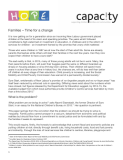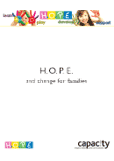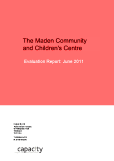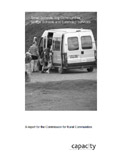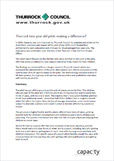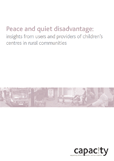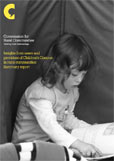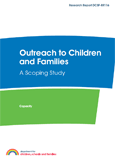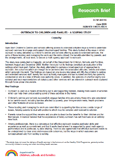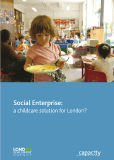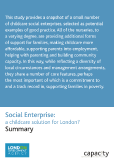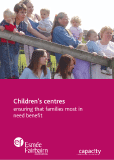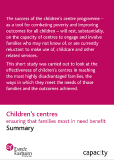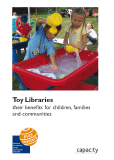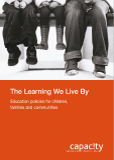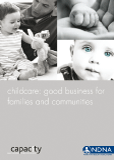Publications
New
Families - time for a changeToo many families are among the learning poor, and access to education should be as full an entitlement as free healthcare or funded childcare. Families should have more say in determining the services they need. Their perspectives on the challenges their children face should be the starting point for policy-makers. |
Hope and Change for FamiliesChildren's centres could hold the key to families’ economic well-being. A new report – Hope and Change for Families – describes how a children’s centre in Bromyard is tackling a lack of jobs in the local area, supporting small businesses and helping parents to gain skills. |
Maden Community and Children’s CentreIn Rossendale in Lancashire, the Maden Community and Children’s Centre is helping to create change for families. An evaluation of this former Sure Start Local Programme found that for some families it had “changed their lives”. Health and ante-natal care, support for new parents, adult literacy and numeracy, drama and family fun days, job seeking, social enterprise and volunteering are part of the 40 plus services created by the children’s centre. |
|
Small Schools, Big Communities: Village Schools and Extended ServicesRural schools could hold the key to the big society, but need to maintain their commitment to wider extended services, such as breakfast clubs, youth work and support for families, according to a new report by Capacity for the Commission for Rural Communities. The report, Small Schools, Big Communities: Village Schools and Extended Services highlights the work of four extended services clusters in raising the achievement of children and young people in isolated communities. Village schools, in particular, play a crucial role in tackling under achievement and in enabling families to access services. As local authorities are required to reduce their spending, it is vital that the needs of rural families are not overlooked. Childcare and other services alongside schools strengthen village life. At a time when there is a new governmental emphasis on democratic renewal and the involvement of people in services, schools as the hubs of rural villages appear to offer an important template. |
Thurrock two-year old pilot: making a difference?In 2010, Capacity was commissioned by Thurrock Council to evaluate and evidence the short-term outcomes and impact of the pilot phase of the DCSF-funded free entitlement to early education and childcare for disadvantaged two-year-olds. The evaluation found that the children who were part of the pilot live in families which are on low incomes and in nearly two-thirds of cases, with no-one in work. The majority live in lone parent families and two-thirds have additional needs. The places were found to have been of crucial value for the children involved, supporting speech and language, social skills and general development. Parents believed that the places had also helped them with parenting issues. |
|
Peace and quiet disadvantage: insights from users and providers of children’s centres in rural communitiesThis study, undertaken by Capacity for the Commission for Rural Communities, provides an overview of the challenges and opportunities of delivering children’s centre services in rural areas and the experiences and perspectives of parents of young children. It also sets out the key areas in which change is needed to improve support for families through rural Children’s Centres. This report raises some important issues for providers and funders around accessibility, provision of employment and training, isolation and rural poverty. |
Lifelong Learning and the early yearsThis essay, by Margaret Lochrie, for the Inquiry into the Future of Lifelong Learning (IFLL) considers the intergenerational benefits of an enhanced and expanded adult learning entitlement. In particular, it makes recommendations for:
Hosted by NIACE, the Inquiry into the Future for Lifelong Learning was launched in September 2007 and reports on 17th September 2009. |
OutreachSure Start Children’s Centres and schools offering access to extended activities have a remit to undertake outreach services to engage and support disadvantaged families. This study, by Capacity for DCSF, looks at the ways in which outreach is being delivered by children’s centres and schools; the aims of those leading and managing the work and the benefits identified by parents. Among the findings are:
|
Other publications
Social enterprise: a childcare solution for London?This study, in 2008, for the London Development Agency and the London Boroughs of Westminster, Hackney, Lewisham and Brent, provides a snapshot of community nurseries as social enterprises. All of the nurseries featured are supporting families, making childcare more affordable, helping parents to gain and sustain employment and building community capacity. In this way, the nurseries in the study are tackling the excessively high levels of child poverty found across the capital and in the boroughs studied. In the government implementation of the National Childcare Strategy there has been an almost exclusive concentration on curricular and regulatory systems, with very limited attention to sustainable business model or sustainability. It is suggested that DCSF might wish to now consider the particular value of social enterprise as a childcare solution for London and elsewhere. |
Children’s Centres: ensuring that families most in need benefitThe success of the children’s centre programme – as a tool for combating poverty and improving outcomes for children – will rest, substantially, on the capacity of centres to engage and involve families who may not know of, or are currently reluctant to make use of, childcare and other services. This short study, funded by the Esmee Fairbairn Foundation, was carried out to look at the effectiveness of children’s centres in reaching the most highly disadvantaged families, the ways in which they meet the needs of those families and the outcomes achieved. |
Toy Libraries: their benefits for children, families and communitiesThis study provides a snapshot of toy library provision in England. Drawing on case studies of good practice, it illustrates how community toy libraries can help to equalise access to play experiences for children affected by poverty or disability. The study also illustrates the wider range of benefits offered by toy libraries, in supporting parenting, in contributing to the aims of Every Child Matters and in building stronger communities. |
|
The Learning We Live By: Education Policies for children, families and communitiesThis booklet considers education policies as they affect children and families. Drawing on the experience and knowledge of childcare, education and policy analysts, it suggests that more can and should be done to narrow the gap in life chances for the least advantaged children and to promote the economic well-being of families. The booklet also considers the ways in which children’s services could be reconfigured and enhanced to meet the needs of families. |
|
Childcare: Good Business for Families and CommunitiesThis report, undertaken for the National Day Nurseries Association, is both an analysis of Government policy as it has impacted on private sector providers and an exploration of the means by which the sector could be strengthened and helped to diversify. It considers also the diversity of business models which can be found within the private childcare sector, relating these to the emerging development of social enterprise and suggests ways in which the social enterprise model might add value to day nursery businesses. The report concludes that day nurseries are essential to the provision of affordable good quality childcare and are a key strand of socially responsible business activity. If the potential for day nurseries to contribute to the Childcare Ten Year Strategy is to be maximised effective models of partnership need to be developed between providers and local authorities; and day nurseries should embrace fully policies to promote inclusion, tackle educational achievement and combat poverty. |
|

